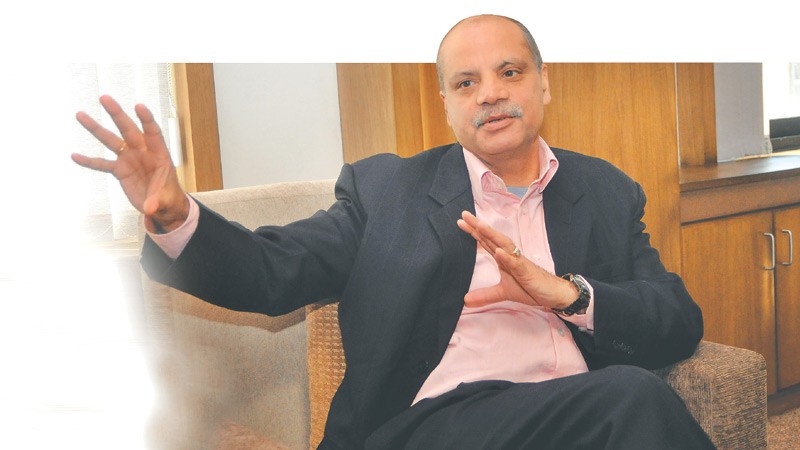Kathmandu, January 23, 2017: It was in the early 80s that Upendra Poudyal first began his working career as an accountant at the Soaltee Crowne Plaza. Having worked in the hospitality sector for six years, Poudyal wanted newer challenges and joined Grindlay’s Bank (now Standard Chartered Bank) in the credit and marketing department. Poudyal, who served at the managerial level at the bank, later moved on to become a CEO at a finance company, which now is the NMB Bank. In this interview with Alisha Sijapati, Poudyal talks about his corporate journey and shares some of his management mantras. Excerpts:
You have been involved with NMB Bank since its inception, how different was the transition converting NMB from a finance company to an ‘A’ class commercial bank?
When I got the offer to become a CEO of the finance company, I was very keen on taking up the project because I had already worked at Grindlay’s for over a decade and I needed something different and desired more responsibilities. Obviously, the journey from turning a finance company to now an A-class commercial bank was not a smooth transition. But because I worked at an international commercial bank for so long, I was confident that I could do it. To reach the minimum requirement, we had to merge with several financial institutions and collect a massive amount of money. Currently, our bank has a joint venture agreement with Nederlandse Financierings-Maatschappij voor Ontwikkelingslanden (FMO), wherein FMO holds 20 percent of the bank’s shares and is our largest shareholder.
You have overseen several merger acquisitions over the years, how challenging is it to merge with other institutions and collaborate as a team?
Merger acquisition is not an easy task and moreover, it is not at all easy, when different teams collaborate and work together—we have had our own shares of ups and downs. What I have felt over the years is that you need to communicate to reach out, especially, when you hold a senior position like mine, and it sometimes gets extremely challenging to look after all the nitty-gritty issues all by yourself. So, when we merged with other financial institutions to become a commercial bank, I made sure that the professional relationships were made before the acquisitions, this way the employees felt special and also, all the employees were mentally prepared to work together as a team. Time is critical during such acquisitions, employees get skeptical over their positions and it is the team of HR that needs to ensure a smooth transition. It is their duty and the management’s duty to make sure that the employees are given the space and to reach out when they need assistance.
What are the keys to managing a large workforce like NMB’s?
I believe in transparency and communication. I think even a small issue should be communicated so that there is no room for negativity. There needs to be a proper system at every level. Sometimes, I may get biased and pass on certain projects or services to certain customers but I get knocked on the head, when the papers are rejected by my employees—the best part here is that we all have ownership of our work and we let our employees be a part of the decision making process. This form of transformational leadership not just helps the bank evolve but it also helps the employees professionally and personally.
How important is customer service in the banking sector?
Our vision is to establish ourselves as a leader in this sector by putting high priority on customer care. Since its inception in 2008, we have opened 71 branches with seven extension counters. Banks are public entities and we have a huge responsibility in securing the public’s needs. If we do not provide the best services to our customers, how can they develop trust in us? Like I said before, banks are public entities, we are in the business because of the customers and if we don’t value them and accommodate their wishes, there is no point in continuing to operate.
You have over 71 branches all over the country and seven extension counters, how does the management decide the transfer of the staff to different locations and what kind of issues does the bank face in terms of HR?
There are very minimal cases where employees reject transfers. In our bank, we mostly transfer employees to the places they are based where they are comfortable and ready to adjust. The transfers are always a well thought out, as we look at the aptitude and skills of the employees. Also, my advice would be is take transfers as an opportunity to grow your career. You never know what is in store for you.
What are your management mantras?
I am a strong believer of participative and transformational style of leadership. I like to work in a team and communicate properly so that there is no place for errors.
If you believe in perfection, you will get it. The benefit of participative management style is you have a sense of ownership, which leads to motivation. I consider collaboration to be the key to managing any team. You need to respect, be humble and be grateful to what you have.
What advice do you have graduates wanting to join the corporate sector?
The only key to success is hard work and through challenging yourself. You are your own competition. Update yourself regularly and enhance your knowledge and skill set. Be respectful towards everyone and be open to criticism.







